In a hurry? Get our list of 56 higher education lead generation sources right away!
Selling higher education courses in our country is a tricky, tricky business. That’s because like most things in India, college admissions are a huge family affair!
I remember the hustle that filled the days after my 12th board results. My mother wouldn’t stop praying to God for unrealistic stuff, like making Delhi’s best college lower its cut-off by 5% for my benefit. My father kept bringing me form after form, trying to make sure I get into some college even if the ome examples includeaforementioned prayers failed. A chirpy potpourri of relatives kept calling up and calling in, “helping” us out with tales of their brilliant kids in brilliant institutes.

You’d probably agree that it takes a whole lot of time, trust and well-wisher testimonials for a person to finally sign up for a college in India.
What does this mean for you, as a person who markets higher education courses and colleges in India?
It means that you need compensate for the low conversion rate with high lead volume, which becomes a make-or-break factor for your business. And to help you whiz up the right numbers, here’s a complete guide to higher education lead generation in India :-
List of Higher Education Lead Generation Sources in India
1. College and Course Search Portals
These portals help students search colleges or courses according to their specific criterion. They are used by parents as well as students. Often, they provide free resources such as discussion forums, counseling support and informative articles as well.
As such, they attract a lot of traffic and tend to rank on Google’s first page for the common search terms that students use. For example, here’s what the search results for ‘top MBA colleges in Delhi’ look like :-
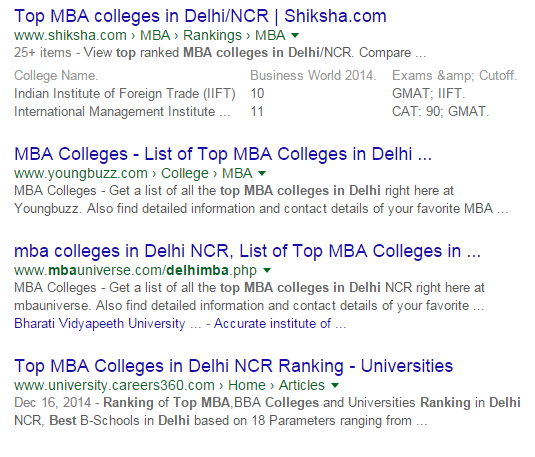
These portals provide free listing as well as a bouquet of marketing options to education businesses. These can include running display ad campaigns, sending emails to students matching a particular criteria etc. For example, Shiksha.com provides display advertising in the form of ‘featured’ sections on its website :-
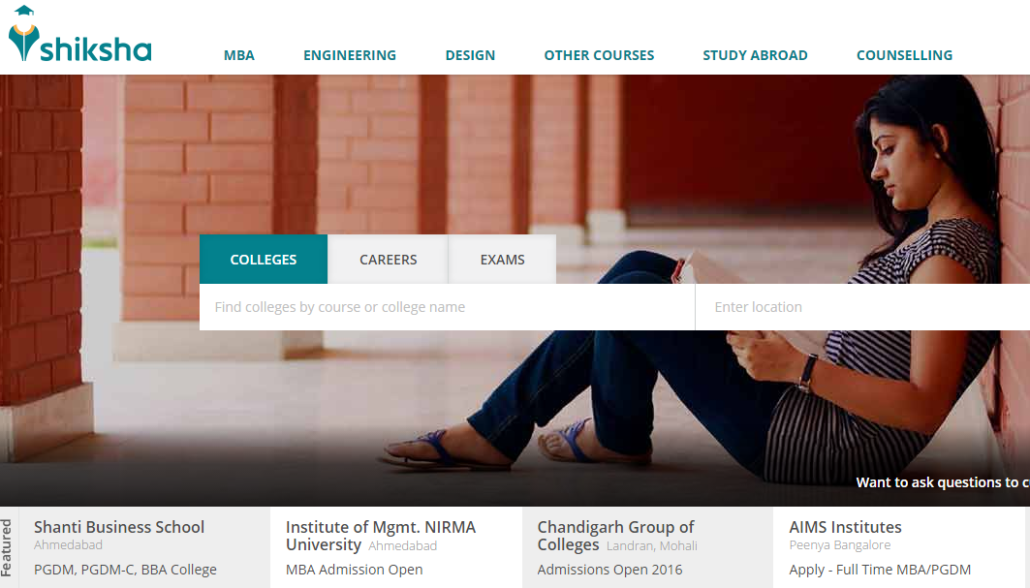
The search portals you need to target depend upon the course that you offer (for example, MBAUniverse is primarily for B-schools). However, the top portals for a wide variety of courses include Shiksha.com, CollegeSearch.in, HTCampus.com, YoungBuzz.com, MingleBox and CollegeDunia.
2. Competitive Preparation Sites and Magazines
Such websites/magazines provide resources to students preparing for competitive exams such as CAT, CLAT, etc. Their visitors/readers tend to be serious about a particular course. Therefore, these platforms can generate much more qualified leads than search portals.
For higher education lead generation, they provide direct advertising options to colleges. Some websites may also enable Adsense, which means you can advertise on them by using Google display ads.
The top competitive preparation magazines are Pratiyogita Darpan, Competition Success Review (CSR) and Success Mirror. JagranJosh.com and OnlineTyari.com are some of the competitive preparation websites that cater to a large number of courses.
3. Education Discussion Forums
These forums act as online platforms for students preparing for a particular exam to interact with their peers. Many of these forums also provide education-related news, expert interviews and other information to attract first-time users to their community.
They offer many advertising avenues for higher education lead generation. For example, PagalGuy, which mainly caters to MBA aspirants, offers the following marketing solutions to its institute clients :
- interactive banners,
- newsletters,
- sponsored articles,
- sponsored usernames etc.
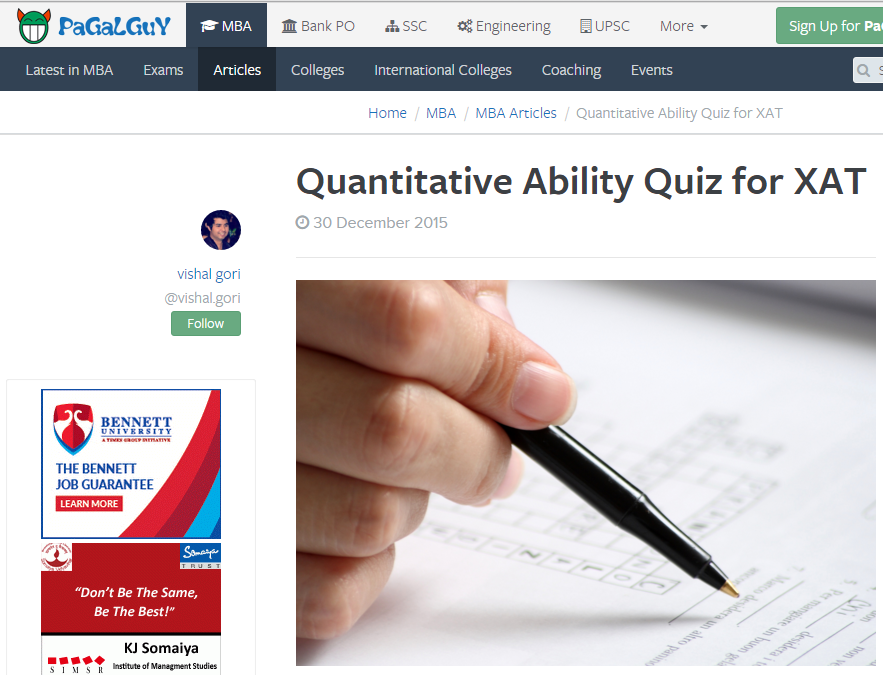
However, you can also generate leads for free by creating your profiles on such platforms and promoting your college by answering relevant queries, and providing real value to students while doing so.
Other popular forums include TotalGadha.com, CBSEGuess.com, ICSEGuess.com, etc.
4. Career Portals and Magazines
Such portals or magazines focus on career related content and tools, typically covering both education as well as work life. A few of the most popular names in this field are Careers 360, LearnHub.com, India Today Education, etc. They offer multiple advertising options for higher education lead generation.
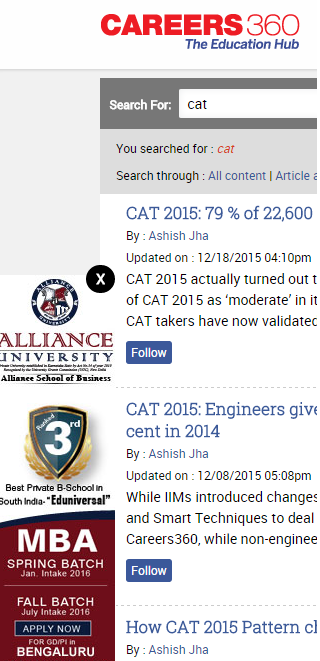
Most of the education-related content on such websites is targeted at both parents as well as students, to help them find/choose the right course and right college for themselves.
Because of this broad outreach, these platforms can be a good source of leads for colleges offering a bouquet of courses in multiple fields, as they act as a single means to give you exposure to students from diverse backgrounds.
Also, as these platforms create content even for students interested in niche fields, they are must-try options for colleges offering less mainstream courses that do not have dedicated online spaces of their own.
5. Campus Portals or Magazines
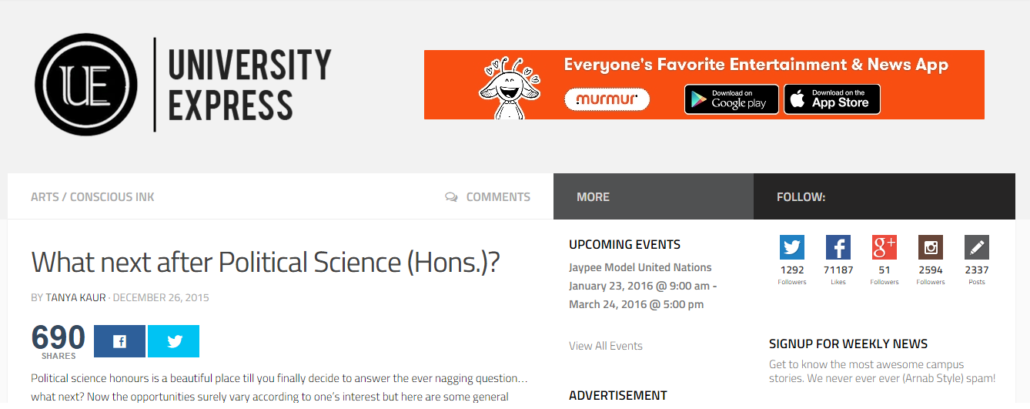
These portals/magazines cover campus life and often have dedicated sections on career. Some examples include University Express, DUBeat, Campus Ghanta, etc.
You can advertise on the ones that chiefly focus on students pursuing their graduation, if you offer post-graduation courses.
However, while these platforms are good for exposure, they might not get you high-quality leads, as the people going through such sites may or may not be interested in pursuing higher education. Besides, you should give it a miss if the parents are the key decision-makers for your course, and not students, because such platforms reach out only to the latter.
6. Coaching Institutes
Many coaching institutes let you advertise on their websites and also offer other advertisement options such as list slots. For example, here’s what advertisements on TIME’s homepage look like :-
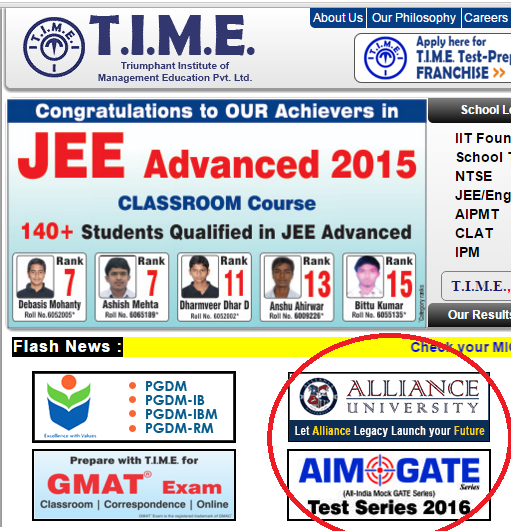
7. Advertise with Search Engines
Search engines offer many advertising options to businesses, such as ads on the search results page (above or next to the organic results), ads on the websites/apps who partner with them, etc. They come with tools (like Google’s Keyword Planner) to help you find the keywords or search terms your prospects are using. Besides, as they have access to immense data about their users and their browsing patterns, they offer highly focused targeting options to make sure your ad reaches the right people at the right time.
Google is the most visited site in the country and across the world. It offers various advertising options through Google Adwords :-
Display Network : These ads appear on relevant websites, apps, etc. in Google’s partner network (that is, those who sign up with Google Adsense to monetize their site or app). You can also choose specific websites you want to target, so long as they have enabled Adsense.
Search Engine Network: These ads appear on the top or to the side of Google’s search results for particular keywords, as specified by the advertiser.
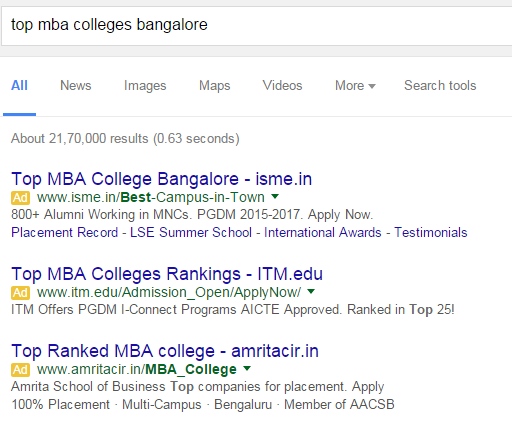
Search with Display Select : These ads are displayed both in the search results as well as in its display network. However, the display network chosen is more carefully targeted.
TrueView Video Ads: These are video ads that appear before or in the middle of a YouTube video and also display network videos, games and apps.
Yahoo and Bing are other search engines that see significantly lesser traffic than Google, and are therefore cheaper to put search/display ads on. These services operate upon a pay per click/view model (that is, you are charged only when your ad is clicked or viewed). This cost per click/view depends upon multiple factors such as industry, competition, etc.
Bonus: We did an expert webinar on running Google Adwords campaigns effectively. You can watch the recording and get answers to some questions you might have here.
8. Advertise on Social Networks
Popular social networks have large user bases and access to a lot of data on their interests and activities. As such, they are able to offer highly targeted and inexpensive advertising solutions to businesses. Higher education marketers can advertise on the following social media platforms, depending upon the kind of course they offer :-
Facebook : Facebook ads are usually the cheapest and can help you a lot in higher education lead generation. Since people from across all backgrounds are on Facebook, it is definitely a must try for higher education marketers selling any course. Facebook’s targeting options are all the more useful and straightforward for education marketers, as you can target people who have done specific courses, attended specific schools, or completed specific educational levels, with ease.

Bonus: Here are a few articles on using Facebook for lead generation that you would find useful:
Twitter : While Twitter does not provide a direct targeting option for education businesses, you can still use it to reach out with a large number of prospects by targeting specific keywords or interests. You can also create your own tailored audience based on your email lists.
Both Facebook and Twitter offer lead ads, that make it all the more easy for you to deliver high performing ads.
LinkedIn : If you’re marketing a course that could be useful for people with work experience, LinkedIn ads can be a great way to connect with relevant professionals. For example, software engineering professionals with 2+ years of experience can be a good audience for generating leads for Executive MBA programs.

Instagram : As a photo-sharing site, Instagram is a favorite with people in creative fields, such as fashion, art and craft, etc. If you’re marketing courses in such fields, you can run ads on Instagram to reach out to your target audience.
9. Track Social Networks
Quora and Reddit are two platforms where prospects regularly post questions about various colleges and courses. You need to keep track of these social networks and answer helpfully whenever possible.
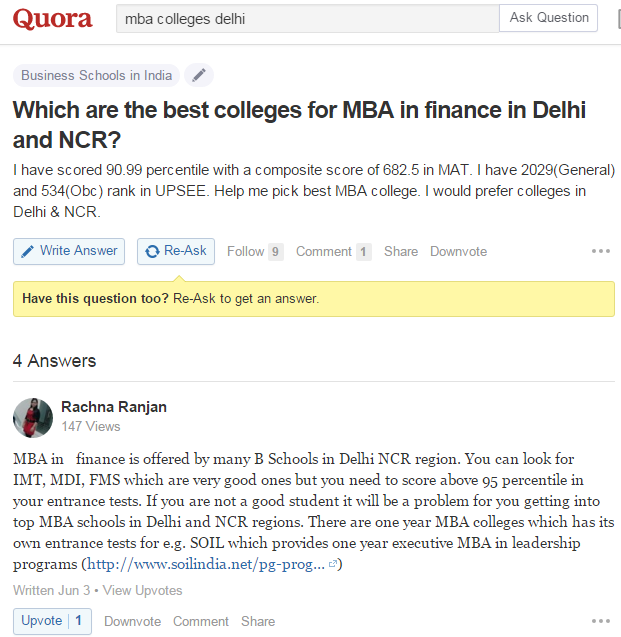
For example, on Quora, you can appoint a company spokesperson to answer all questions relating to your course/college as well as the associated competitive exams. Make sure you do not pitch your institute in each post and also, avoid using the same text in each answer. These are obvious red flags for spam! You can also create a Quora topic about your institute to organize queries better.
10. Long-run Lead Generation
Lead generation for higher education without advertising is hard, because of immense competition, but it is possible if you plan your marketing activities with the long-run in mind.
Website
Firstly, make sure you have a professional, credible, informative and conversion optimized website. Here’s where you can find ideas and inspiration for making a great education website.
While you need to have a website from the get-go, so as to establish yourself as a reliable institute, initially, it will generate leads only through the traffic coming in from your ads on various websites. You can convert these hits into leads by enabling live chat (accessible on providing email), email subscription options, free consultation offers on sign-up, etc.
In the long-run, however, as you establish your brand name, your website will become an independent source of lead generation as more and more people search for your institute and land up on your website, organically, and not simply through ads.
Content Marketing
Advertising with search engines can get you the top slots for keywords that you want to target, but that cannot be a viable long-term strategy because of the expenses involved. This is especially because ranking organically for search results will get you higher conversion rates, as people can easily distinguish between the ads and the actual results.
In order to rank organically for the keywords that your prospects are searching for, you need to create and promote valuable, search-engine optimized content around those topics. You can experiment with the nature of the content, depending upon your budget and target audience.
For example, you can write articles about the various financial options a student can consider for sponsoring their higher education degree. You can upload recorded sessions of a few of your classes on your blog and/or a YouTube channel, to give your prospects a clear idea of what the institute offers to it’s students. This can be immensely useful in the decision-making process. You can also invite career counselors to answer common queries either through a live chat or a webinar.
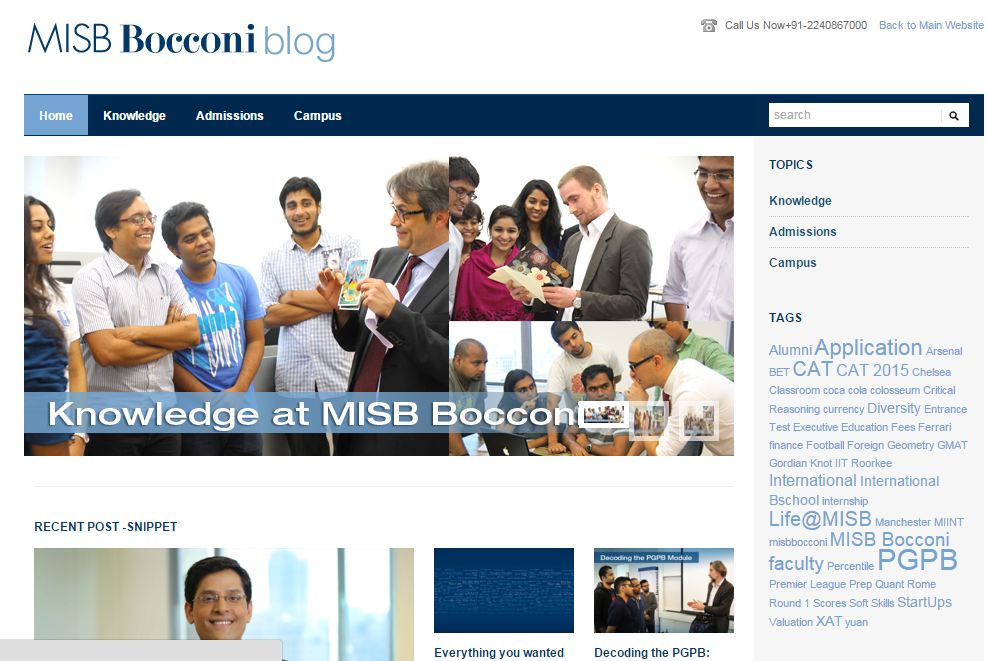
Apart from helping with your rankings, maintaining a blog will increase your trust worthiness amongst students. Unlike your advertising efforts, your blogging endeavours will provide actual value to the prospects and therefore be perceived more favourably than the former.
Bonus: Creative content marketing ideas for education
Social Media
You can use your social media platforms to engage with your prospects. You can share links to your blog posts and videos on them, run contests, quizzes and giveaways based on educational topics, organize online events such as hashtag-based Q&A (for example, you can dedicate one day a week where you answer all MBA queries hashtagged with your institute’s name), etc.
Online Courses
You can sign up with online course providers such as Udemy, Coursera and DigitalVidya to provide free/paid courses on various subjects. Providing free online courses will get you wider exposure, while paid courses will help you generate additional revenue.
However, whether you opt to offer free or paid courses, this can be an effective strategy higher education lead generation if used wisely. For example, if you provide a free basic marketing course for entry level professionals, this can be your chance to build your credibility for your flagship Executive MBA program.
And with that, we’re done with the first in a series of posts on generating higher education leads in India! I hope you found this one insightful. If you have any questions or feedback, please leave a comment & I’ll get back as quick as I can!
P.S.: Watch out for our next post on the ways in which higher education businesses can generate leads offline!
FAQs
How can we ensure the quality of leads generated through these sources
While exploring various sources, prioritize quality over sheer numbers. Consider partnering with reputable lead generation platforms or educational consultants who specialize in student demographics relevant to your institution. Utilize qualifying questions during lead capture to identify students with a genuine interest in your programs and a strong fit for your academic offerings.
How much should higher education institutions typically invest in lead generation?
Lead generation costs can vary. The ideal budget depends on factors like your institution’s size, target audience, and chosen lead generation strategies. Research industry benchmarks for lead generation costs in Indian higher education. Start with a pilot program or test specific lead sources to measure return on investment (ROI) before scaling up your budget.
How can traditional marketing methods still be effective for lead generation in India?
While digital marketing plays a significant role, consider a multi-channel approach. Explore strategies like attending education fairs, collaborating with local schools and counselors, or even leveraging alumni networks to reach prospective students. These traditional methods can complement your digital efforts and provide valuable touchpoints for student engagement.









![17 Website Optimization Mistakes You Need to Stop Making [Free E-Book] 14 Website conversion optimization mistakes to avoid](https://www.leadsquared.com/wp-content/uploads/2021/11/Website-conversion-mistakes-e-book-1-80x80.png)